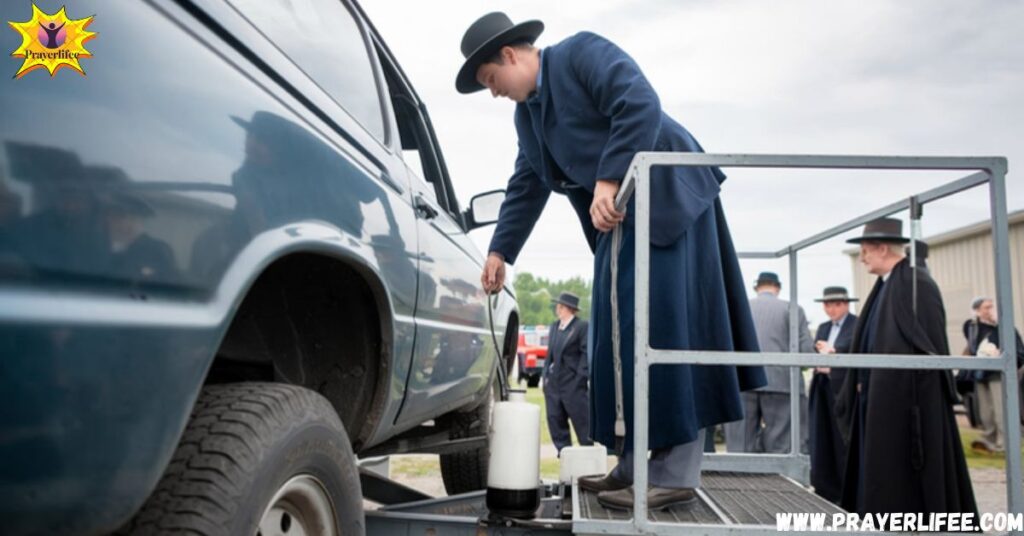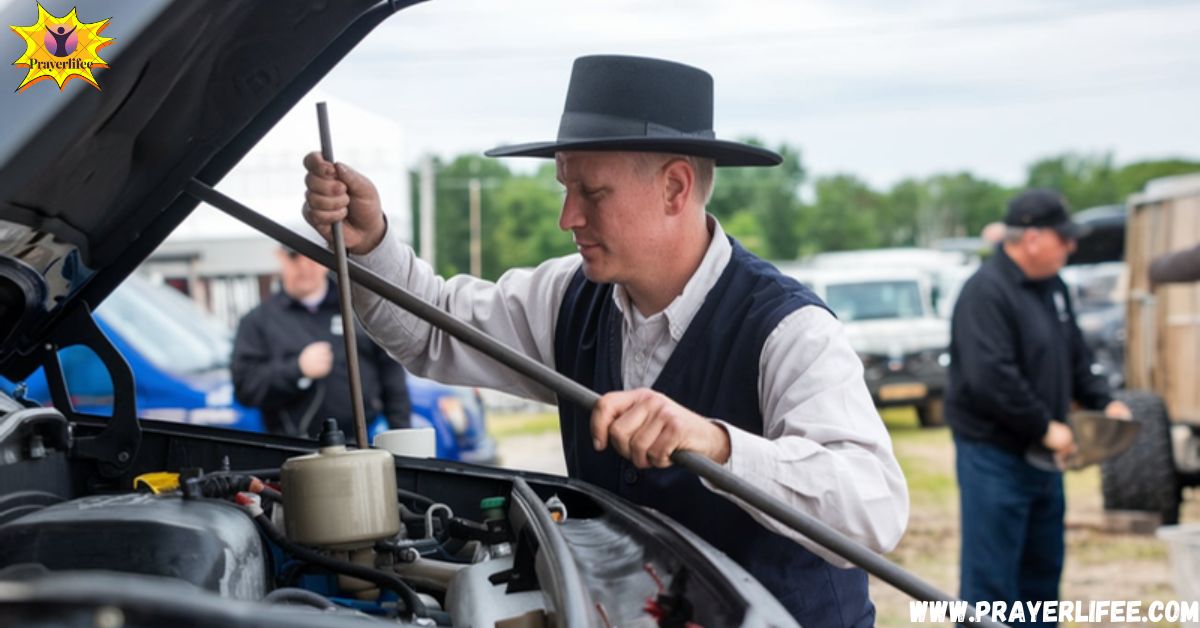The term “Amish Oil Change” refers to a humorous phrase often used to describe skipping modern car maintenance, specifically oil changes. It’s a play on the Amish lifestyle, which avoids modern technology. While the Amish don’t actually perform oil changes, the term is linked to their simple, traditional practices.
Curious about what this quirky term really means? The phrase has sparked a lot of interest online, often leading to confusion and jokes. Let’s explore why this unusual expression continues to catch attention in 2025.
The “Amish Oil Change” blends reality with humor. It highlights how the Amish community maintains their horse-drawn buggies and tools, using traditional lubrication methods instead of modern car care. Although the term may sound strange, it reflects how we often associate simplicity with the Amish way of life.
What Is an Amish Oil Change?

The term “Amish oil change” has a few different interpretations, but it often serves as a humorous way to reference something that involves simple living maintenance or skipping a traditional oil change altogether.
In some cases, people use it as a slang term or as a way to poke fun at the contrast between modern vehicle maintenance and the Amish way of life. To understand this better, we need to look at both the literal and the humorous meanings of the term.
Literal Meaning
Since the Amish do not own or use cars, the idea of changing motor oil in a traditional sense doesn’t apply to them. However, they still maintain their transportation methods and farm equipment, using different lubrication methods. The Amish maintain horse-drawn buggies, wooden wheels, and non-motorized tools that require regular upkeep, including greasing the axles and caring for the wooden parts.
They also use diesel-powered Amish equipment for certain farm functions, and those need lubrication as well. While the term “oil change” doesn’t directly apply to the Amish way of life, the traditional lubrication techniques they employ serve a similar purpose—keeping their equipment in working order without relying on modern technology.
Humorous & Slang Meaning
In a more lighthearted sense, the phrase “Amish oil change” is often used as a joke. It refers to either skipping a traditional vehicle oil change altogether or performing it in a very old-fashioned way. For example, some might use it to describe greasing wooden wheels on a horse-drawn carriage instead of changing oil in a modern car.
The term has also evolved to represent anything that is done in a minimalist, old-school manner—something simple and without the bells and whistles of modern technology. It’s become a fun way to describe alternative maintenance practices or to humorously criticize those who avoid the routine oil changes cars require.
Read More: Convatec From: 416400 to: 416419 – Natura Closed End Pouch with Filter
The Amish and Technology: Why Traditional Oil Changes Don’t Apply
The Amish are known for their rejection of many modern technologies, and this includes traditional vehicle upkeep such as oil changes. Their decision to avoid cars stems from a larger philosophical and spiritual commitment to Amish traditions, simple living, and community values. By rejecting technology, they maintain a lifestyle focused on self-sufficiency and traditional skills, so traditional vehicle maintenance alternatives simply don’t align with their way of life.
Do the Amish Use Vehicles?
The Amish do not use personal cars, but they do rely on other forms of transportation, such as horse-drawn buggies, bicycles, and even scooters. Their rural transportation maintenance is centered around keeping these methods of transportation in working order. These methods of transportation require lubrication for wooden wheels, axle grease, and other maintenance methods, but they don’t require the same maintenance as a modern car.
Why Do the Amish Avoid Cars?
The Amish way of life and technology revolves around community values, and cars are seen as a threat to that. Cars promote individualism, and the Amish believe they create a sense of dependency on outsiders. In their view, a car-based society would disrupt their ability to remain self-sufficient and connected to their communities. Thus, they use horse-drawn buggies and other alternative transportation methods that align with their values.
How the Amish Maintain Their Equipment Without Oil Changes
While the Amish don’t engage in traditional vehicle maintenance, they still need to care for their farm machinery and horse-drawn carriages. They rely on a variety of lubrication methods to maintain their tools and transportation.
Buggy Maintenance & Lubrication
Amish buggies are typically made from wood, so they require grease for wooden wheels and regular axle lubrication to keep them in good condition. Greasing wooden wheels is a crucial part of maintaining their transportation, as it prevents wear and tear on the wheels and axles.
In addition to this, Amish buggies often have leather harnesses that need conditioning to ensure durability. These methods, while not the same as modern oil changes, serve a similar purpose—keeping equipment in optimal working order.
Farm Equipment & Tool Lubrication
In the Amish community, sustainable farming tools are maintained with great care. These tools, including horse-drawn plows, saws, and manual drills, are lubricated to prevent rust and ensure smooth operation. Amish farmers also use hand-pumped lubrication systems for their water pumps and other mechanical tools. Though they avoid motorized vehicles, their agricultural machinery requires regular maintenance without modern technology to function properly.
Possible Origins of the Term “Amish Oil Change”

The term “Amish oil change” is not officially documented, but it likely originated as a combination of rural slang and the cultural fascination with Amish ways of life. As modern vehicles began to dominate the roads, the contrast between old-fashioned technology use and the growing dependency on cars became a point of humor.
Rural mechanic slang probably played a role in the phrase’s creation, as it became a shorthand way to describe skipping oil changes or maintaining equipment in a minimalist fashion. The term has since spread online, turning into a meme and part of internet humor, often used to describe anything that’s done without modern conveniences.
Where Did This Phrase Come From?
The term likely gained popularity through internet humor, especially in forums and meme culture. It was used to poke fun at the Amish lifestyle, which is often seen as overly simplistic by modern standards. Over time, the term began to be used in mechanic shops, rural areas, and online communities as a tongue-in-cheek reference to alternative maintenance methods.
Modern Usage & Popularity
In 2025, the term “Amish oil change” is still used widely in internet forums, social media discussions, and even in comedic routines. People use it both literally and humorously, to describe anything that involves simple vehicle maintenance or skipping regular oil changes.
The term has found a place in rural mechanic humor and alternative maintenance practices, where it’s used to discuss the ways in which we maintain our vehicles or other tools in a manner that’s less reliant on modern technology.
Common Misconceptions About Amish Oil Changes
Despite its popularity, there are a few common misconceptions about the Amish and their maintenance practices.
Do the Amish Ever Use Oil?
Yes, the Amish do use oil, but in ways that align with their lifestyle. They use oils and lubricants to care for wooden wheels, farm machinery, and hand tools. They do not, however, change oil in modern vehicles, as they do not drive cars.
Do the Amish Repair Modern Vehicles?
Some Amish and Mennonite mechanics do repair modern vehicles for non-Amish customers. However, these mechanics do not own or drive cars themselves. Their role is to provide a service to those who rely on modern technology while still living according to Amish principles.
Do Amish People Have Any Modern Machines?
Although the Amish reject many forms of modern technology, they do use some modern machines, but these are typically non-electric or designed for specific needs. For example, diesel-powered Amish equipment is used for farming, and some communities use solar power or battery-operated tools that align with their principles of simplicity and sustainable farming tools.
Why the Term “Amish Oil Change” Stuck Around
The term “Amish oil change” has stuck around because it perfectly captures the essence of Amish minimalism in technology and alternative maintenance methods. It’s a humorous way to discuss the contrast between modern vehicle care and the old-fashioned technology use seen in Amish communities. The term also speaks to the broader trend of rejecting unnecessary modernity in favor of simpler, more sustainable methods.
The Disturbing Urban Dictionary Definition
When you search for the term “Amish oil change” on platforms like Urban Dictionary, you’ll come across definitions that can be quite disturbing and not at all related to the Amish community’s true practices..
It’s important to remember that online slang, especially on platforms like Urban Dictionary, can often be misleading and offensive. This has led to misunderstandings about what the Amish oil change actually means. The original intent behind this term was more of a humorous exaggeration about skipping modern maintenance practices, but over time, it has been twisted into something that detracts from the respect the Amish deserve for their traditions and lifestyle.
How the Amish Oil Change Connects to the Amish Community
The phrase “Amish oil change” isn’t just a random slang term—it has a connection to the Amish community, though it’s often misunderstood. As previously mentioned, the Amish are known for their minimalist approach to technology, which includes traditional vehicle upkeep that does not include oil changes in the modern sense. They maintain their horse-drawn buggies, farm tools, and diesel-powered equipment with lubricants and grease, not with motor oil typically associated with cars.
The Amish community’s alternative maintenance methods are centered around self-sufficiency, sustainability, and minimalism, all values that define their way of life. They are selective in how they adopt modern technologies, so they don’t partake in modern vehicle care routines such as oil changes or other mechanical upkeep for cars.
Why You Should Avoid the Term Altogether
While the term “Amish oil change” may seem innocent or humorous to some, it’s advisable to avoid using it altogether—especially when discussing the Amish or their practices. Here are some reasons why:
1. Disrespecting Amish Traditions
The Amish live their lives with a deep sense of community, self-sufficiency, and devotion to faith. Using the term “Amish oil change” can inadvertently disrespect their lifestyle, reducing it to a joke or stereotype. The Amish do not seek attention or make light of their choices, so when their practices are trivialized or turned into a punchline, it can be seen as diminishing their values.
2. Perpetuating Stereotypes
The term “Amish oil change” can perpetuate harmful stereotypes about the Amish community. By reducing their way of life to an internet meme or joke, we fail to recognize the complexities and spirituality behind their choices. The Amish choose to live without many modern conveniences, but this is a deeply thoughtful decision based on their beliefs, not something to mock or misunderstand.
Conclusion
The term “Amish oil change” may have started as a rural mechanic joke or internet meme, but it reflects deeper cultural understandings of Amish traditions, simple living, and minimalist vehicle maintenance. While the Amish do not engage in traditional oil changes for cars, they have their own methods for maintaining their horse-drawn carriages and farm equipment. Whether used humorously or literally, the term continues to intrigue and entertain, making it an enduring part of internet slang and rural humor.
The Amish way of life and technology offers a fascinating contrast to the modern world, and the term “Amish oil change” highlights just how different life can be when you reject modern conveniences in favor of self-sufficiency and traditional methods.

